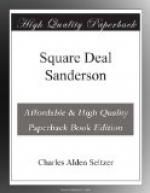She was not in the house—a glance into each room told Nyland that. He went outside again, his face grim, and knelt beside the man.
The latter’s wound was fatal—Nyland saw that plainly, for the bullet had entered his breast just above the heart.
Nyland got some water, for an hour he worked over the man, not to save his life, but to restore him to consciousness only long enough to question him.
And at last his efforts were rewarded: the man opened his eyes, and they were swimming with the calm light of reason. He smiled faintly at Nyland.
“Got me,” he said. “Well, I don’t care a whole lot. There’s just one thing that’s been botherin’ me since you come. Did you think somethin’ was wrong in the house when you was tyin’ your cayuse over there at the corral fence?”
At Nyland’s nod he continued:
“I knowed it. It was the water, wasn’t it—in the trough? I’m sure a damned fool for not thinkin’ of that! So that was it? Well, you’ve got an eye in your head—I’ll tell you that. I’m goin’ to cash in, eh?”
Nyland nodded and the man sighed. He closed his eyes for an instant, but opened them slightly at Nyland’s question:
“What did you do to Peggy? Where is she?”
The man was sinking fast, and it seemed that he hardly comprehended Nyland’s question. The latter repeated it, and the man replied weakly:
“She’s over in Okar—at Maison’s—in his rooms. She——”
He closed his eyes and his lips, opening the latter again almost instantly to cough a crimson stream.
Nyland got up, his face chalk white. Standing beside the man he removed the two spent cartridges from the cylinder of his pistol and replaced them with two loaded ones. Then he ran to his horse, tore the reins from the rail of the corral fence, mounted with the horse in a dead run, and raced toward Okar.
CHAPTER XXIX
NYLAND’S VENGEANCE
Just before the dusk enveloped Okar, Banker Maison closed the desk in his private office and lit a cigar. He leaned back in the big desk chair, slowly smoking, a complacent smile on his lips, his eyes glowing with satisfaction.
For Maison’s capacity for pleasure was entirely physical. He got more enjoyment out of a good dinner and a fragrant cigar than many intellectual men get out of the study of a literary masterpiece, or a philanthropist out of the contemplation of a charitable deed.
Maison did not delve into the soul of things. The effect of his greed on others he did not consider. That was selfishness, of course, but it was a satisfying selfishness.
It did not occur to him that Mary Bransford, for instance, or Sanderson—or anybody whom he robbed—could experience any emotion or passion over their losses. They might feel resentful, to be sure; but resentment could avail them little—and it didn’t bring the dollars back to them.




